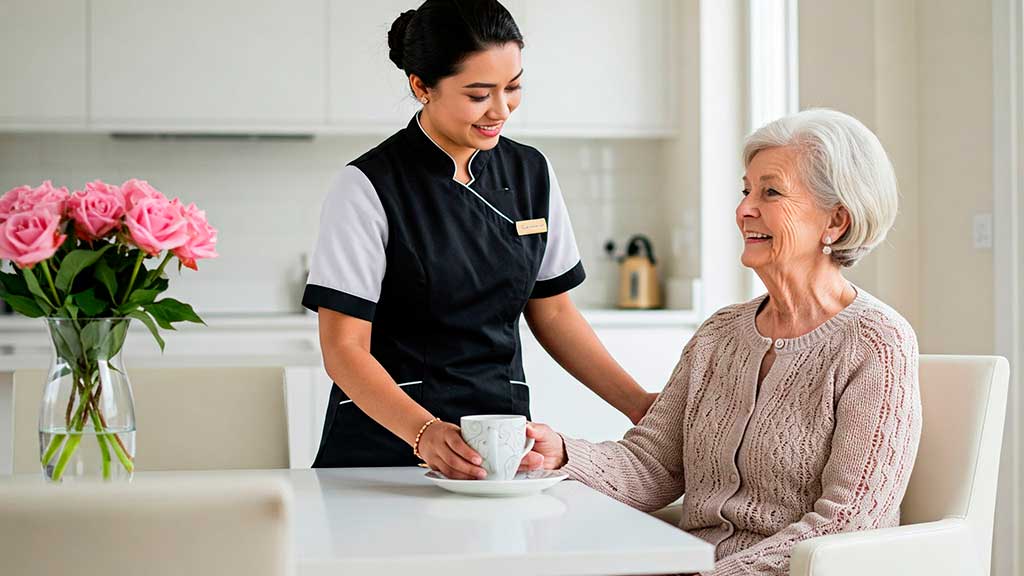The well-being of a home is not only measured by the tidiness of its spaces or the fluidity of its routines. It is, above all, reflected in the harmony and respect that prevail within it. In this context, the emotional and physical well-being of domestic staff is a fundamental pillar. A happy, healthy, and valued professional not only performs better in their duties but also contributes immeasurably to the peace and balance of the family environment. Supporting those who care for us is an ethical responsibility and an investment in the quality of the service we receive. This article offers a practical guide on how employers can foster a positive and sustainable work environment.
Physical well-being: ensuring a healthy work environment
The physical health of domestic staff is the starting point for any successful and long-lasting professional relationship. Household tasks can be demanding, so it is vital to take proactive measures to prevent injuries and illnesses.
Provide appropriate equipment and tools
Make sure your staff has access to high-quality, ergonomic cleaning equipment, such as lightweight and easy-to-maneuver vacuums, or gardening tools that do not cause strain. The use of gloves, masks (when necessary), and appropriate footwear should be encouraged. A small gesture like investing in better tools can make a big difference in the comfort and safety of their daily work.
Encourage task management and rest
Overwork is one of the main causes of burnout and injuries. It is crucial to establish reasonable work schedules and respect days off and breaks. Encourage your staff to take short breaks during the day to stretch or simply relax. A well-structured schedule with guaranteed free time is a sign of professional respect.
Promote health and nutrition habits
If your staff lives in the home, access to nutritious food and a balanced diet is essential. Make sure they have healthy meal options. If they do not reside in the house, consider whether they can have access to an adequate and comfortable dining area, or even if they can bring their own food and drinks. Small details like offering coffee, tea, or bottled water are gestures of courtesy that show consideration.
Emotional well-being: fostering respect and appreciation
An emotionally safe and respectful work environment is just as important as a physically healthy one. Domestic service professionals, especially those who live far from their families, appreciate a home that offers them not only a job but also a sense of belonging and dignity.
Establish clear and respectful communication
Open communication is the foundation of a good working relationship. Speak to your staff with respect, clarity, and without taking anything for granted. Use direct but kind language to express expectations and provide feedback. Actively listening to their concerns and suggestions shows that you value their opinion and experience. Avoiding micromanagement and trusting in their professionalism strengthens their autonomy and self-esteem.
Acknowledge their work and dedication
A simple “thank you” for a job well done can have a huge impact. Publicly acknowledge their effort and dedication. Consider small bonuses for exceptional work or on special occasions. The feeling of being valued for one’s work is a powerful driver for long-term motivation and commitment.
Respect their privacy and personal boundaries
If your staff resides on the property, it is essential to respect their personal space and free time. A private, clean, and comfortable living space is a requirement. As with any employee, their rest hours are inviolable. Avoid contacting them or assigning them tasks outside of their established work schedule unless it is a pre-arranged emergency.
Cultural and social adaptations: a holistic approach
The world is diverse, and in luxury domestic service, it is common to work with people from different cultural backgrounds. Understanding and adapting to these realities enriches the relationship and strengthens the bond.
Cultural sensitivity and respect for traditions
If you work with staff from other cultures, such as those of Nepalese origin offered by Luxury Nepalese Agency, it is vital to show sensitivity to their customs and traditions. Learn about their holidays or special diets. Allowing them to celebrate their festivities or adapting their menu according to their dietary preferences are gestures that demonstrate respect and consideration for their identity, making them feel valued in a foreign country.
Support their personal and professional growth
Investing in your staff’s development is one of the best ways to show your commitment to their well-being. Consider covering the cost of language courses, specialized cooking classes, or smart home management training. This not only improves their skills and professional value but also opens up new opportunities for them in the future.
Conclusion
The emotional and physical well-being of domestic staff is not an add-on, but an essential component of a well-managed and harmonious home. A professional who feels safe, respected, and valued is the greatest asset of a luxury household, ensuring not only impeccable service quality but also the peace and tranquility of all its members. Fostering an environment that prioritizes their well-being is an investment in a solid, lasting, and mutually beneficial professional relationship. At Luxury Nepalese Agency, we believe that excellence in service begins with a profound respect for the person who provides it. Therefore, we advocate for these practices and work to connect our clients with Nepalese professionals who not only stand out for their unparalleled work ethic but also deserve a work environment that celebrates their well-being in its entirety.



